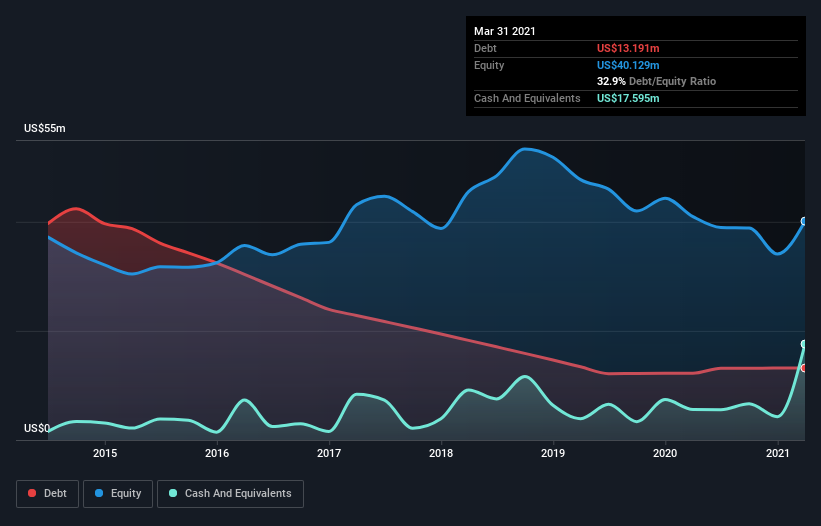David Iben put it well when he said, 'Volatility is not a risk we care about. What we care about is avoiding the permanent loss of capital.' So it might be obvious that you need to consider debt, when you think about how risky any given stock is, because too much debt can sink a company. We can see that Ur-Energy Inc. (TSE:URE) does use debt in its business. But the more important question is: how much risk is that debt creating?
Why Does Debt Bring Risk?
Debt assists a business until the business has trouble paying it off, either with new capital or with free cash flow. If things get really bad, the lenders can take control of the business. However, a more frequent (but still costly) occurrence is where a company must issue shares at bargain-basement prices, permanently diluting shareholders, just to shore up its balance sheet. Of course, plenty of companies use debt to fund growth, without any negative consequences. When we examine debt levels, we first consider both cash and debt levels, together.
See our latest analysis for Ur-Energy
What Is Ur-Energy's Net Debt?
The image below, which you can click on for greater detail, shows that at March 2021 Ur-Energy had debt of US$13.2m, up from US$12.2m in one year. But it also has US$17.6m in cash to offset that, meaning it has US$4.40m net cash.

How Strong Is Ur-Energy's Balance Sheet?
The latest balance sheet data shows that Ur-Energy had liabilities of US$5.26m due within a year, and liabilities of US$48.6m falling due after that. Offsetting this, it had US$17.6m in cash and US$2.0k in receivables that were due within 12 months. So it has liabilities totalling US$36.3m more than its cash and near-term receivables, combined.
Since publicly traded Ur-Energy shares are worth a total of US$266.7m, it seems unlikely that this level of liabilities would be a major threat. Having said that, it's clear that we should continue to monitor its balance sheet, lest it change for the worse. While it does have liabilities worth noting, Ur-Energy also has more cash than debt, so we're pretty confident it can manage its debt safely. When analysing debt levels, the balance sheet is the obvious place to start. But ultimately the future profitability of the business will decide if Ur-Energy can strengthen its balance sheet over time. So if you want to see what the professionals think, you might find this free report on analyst profit forecasts to be interesting.
Over 12 months, Ur-Energy made a loss at the EBIT level, and saw its revenue drop to US$6.9m, which is a fall of 76%. To be frank that doesn't bode well.
So How Risky Is Ur-Energy?
By their very nature companies that are losing money are more risky than those with a long history of profitability. And we do note that Ur-Energy had an earnings before interest and tax (EBIT) loss, over the last year. And over the same period it saw negative free cash outflow of US$8.4m and booked a US$19m accounting loss. With only US$4.40m on the balance sheet, it would appear that its going to need to raise capital again soon. Overall, we'd say the stock is a bit risky, and we're usually very cautious until we see positive free cash flow. When analysing debt levels, the balance sheet is the obvious place to start. However, not all investment risk resides within the balance sheet - far from it. For example, we've discovered 3 warning signs for Ur-Energy (1 is concerning!) that you should be aware of before investing here.
Of course, if you're the type of investor who prefers buying stocks without the burden of debt, then don't hesitate to discover our exclusive list of net cash growth stocks, today.
When trading stocks or any other investment, use the platform considered by many to be the Professional's Gateway to the Worlds Market, Interactive Brokers. You get the lowest-cost* trading on stocks, options, futures, forex, bonds and funds worldwide from a single integrated account. Promoted
New: AI Stock Screener & Alerts
Our new AI Stock Screener scans the market every day to uncover opportunities.
• Dividend Powerhouses (3%+ Yield)
• Undervalued Small Caps with Insider Buying
• High growth Tech and AI Companies
Or build your own from over 50 metrics.
This article by Simply Wall St is general in nature. It does not constitute a recommendation to buy or sell any stock, and does not take account of your objectives, or your financial situation. We aim to bring you long-term focused analysis driven by fundamental data. Note that our analysis may not factor in the latest price-sensitive company announcements or qualitative material. Simply Wall St has no position in any stocks mentioned.
*Interactive Brokers Rated Lowest Cost Broker by StockBrokers.com Annual Online Review 2020
Have feedback on this article? Concerned about the content? Get in touch with us directly. Alternatively, email editorial-team (at) simplywallst.com.
About TSX:URE
Ur-Energy
Engages in the acquisition, exploration, development, and operation of uranium mineral properties in the United States.
Adequate balance sheet and fair value.
Similar Companies
Market Insights
Community Narratives




